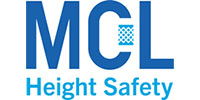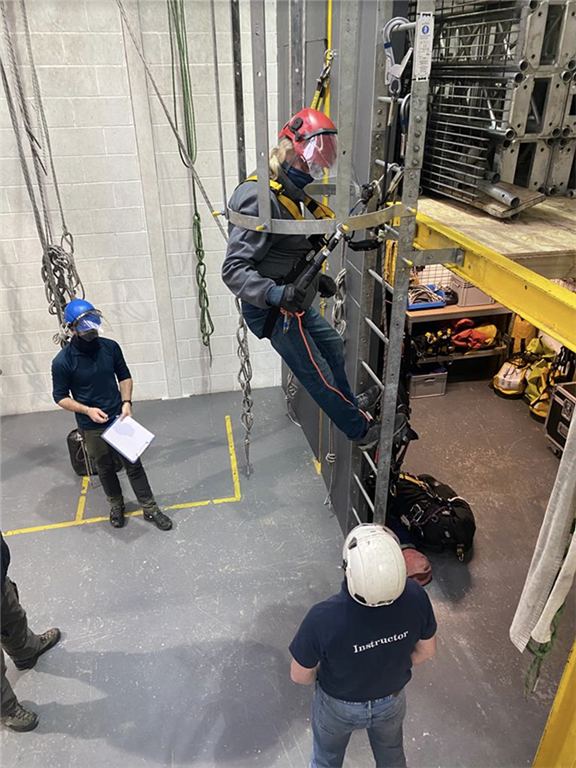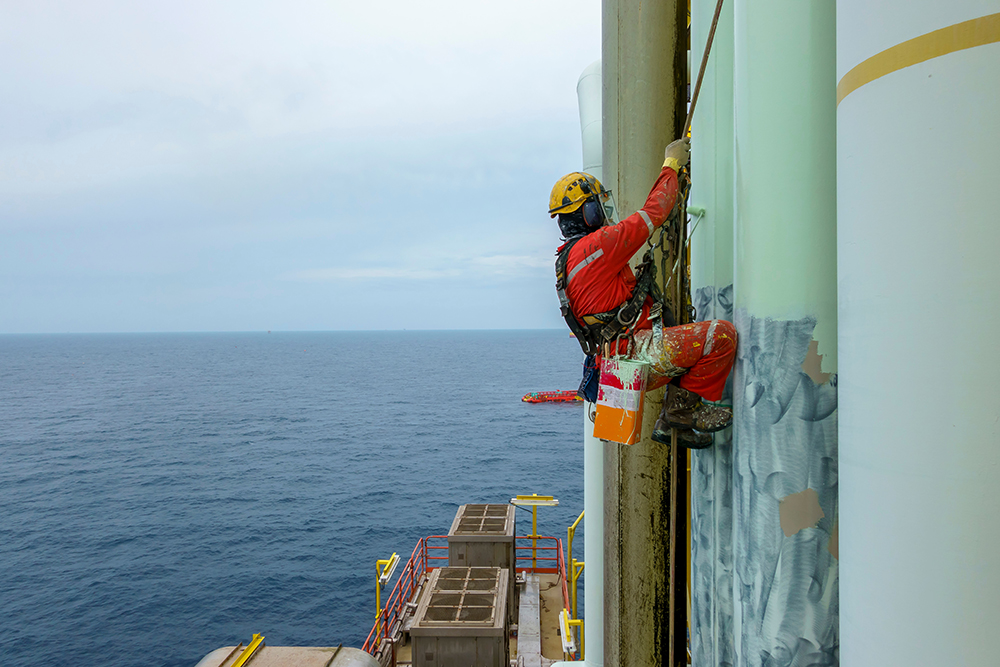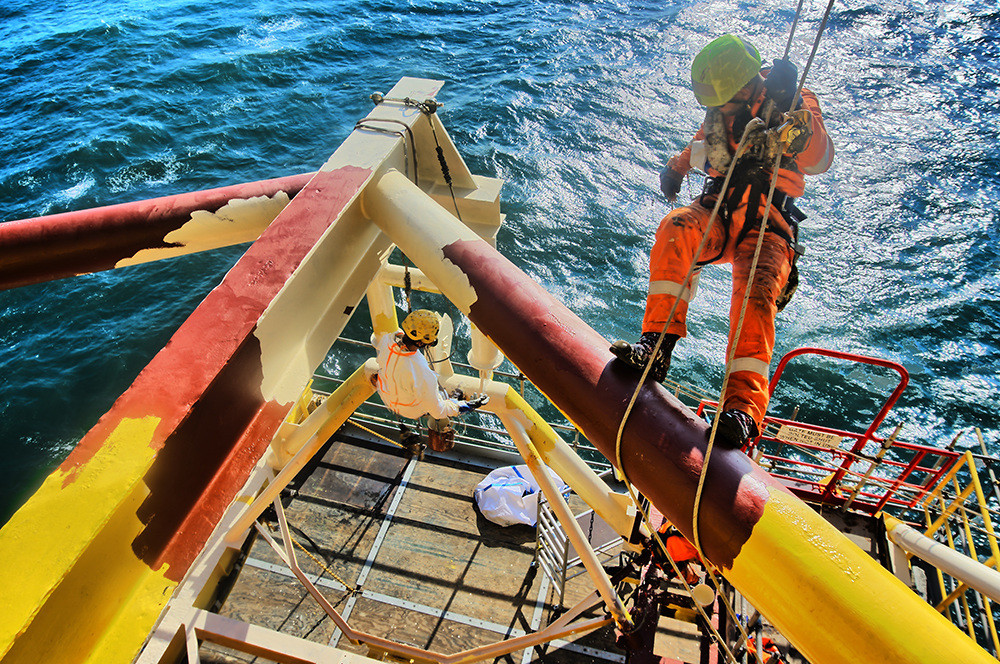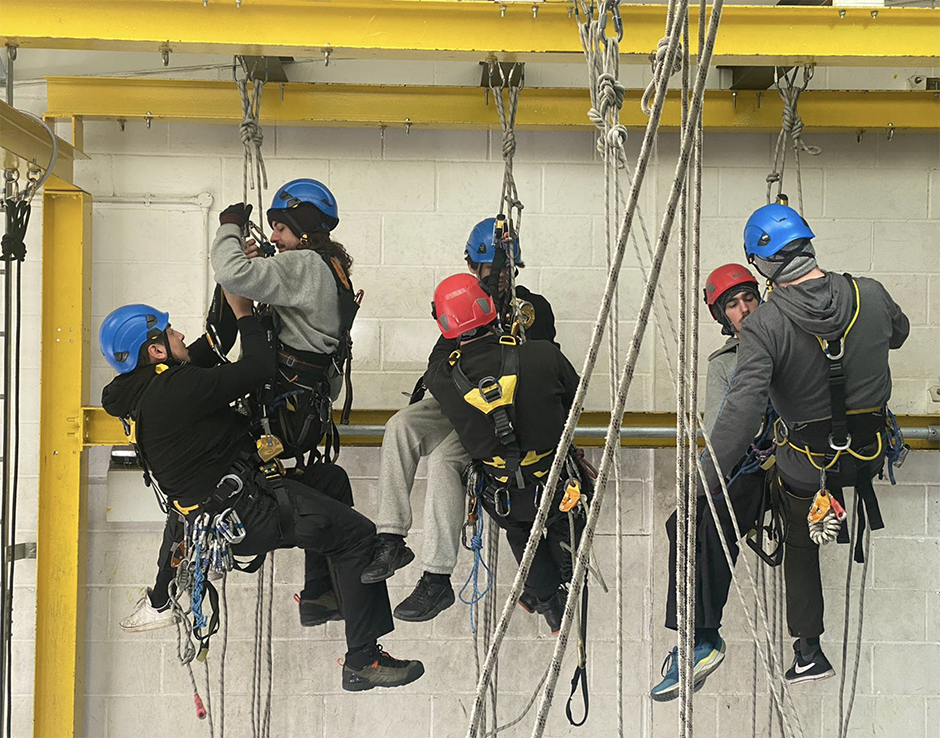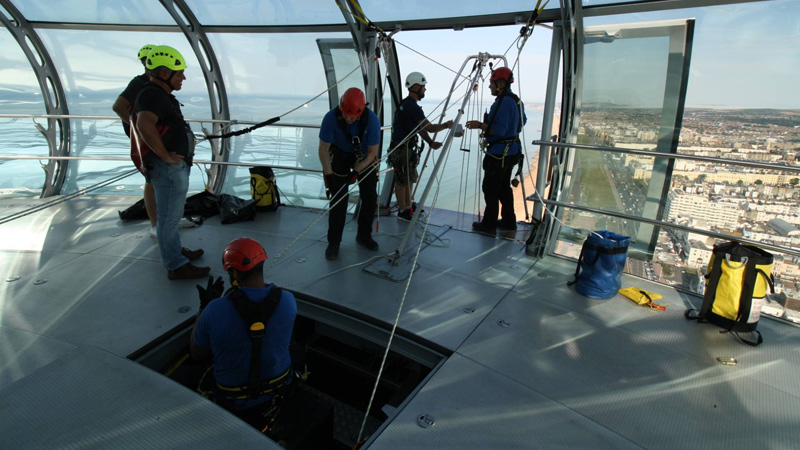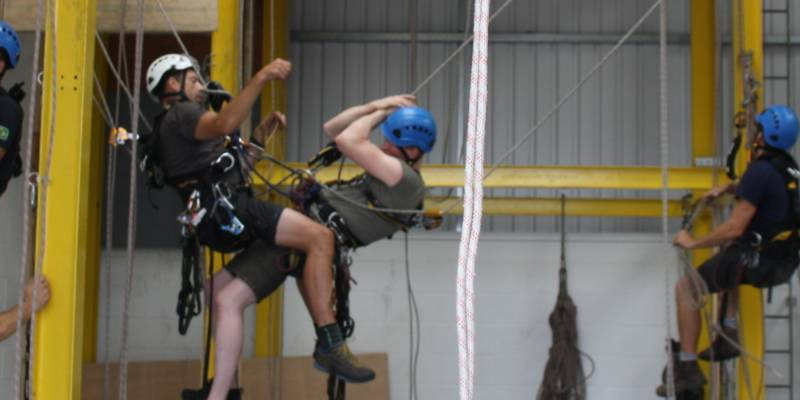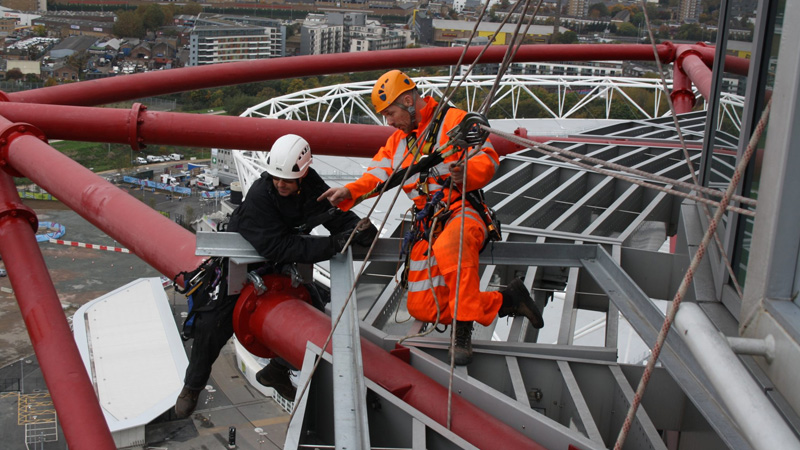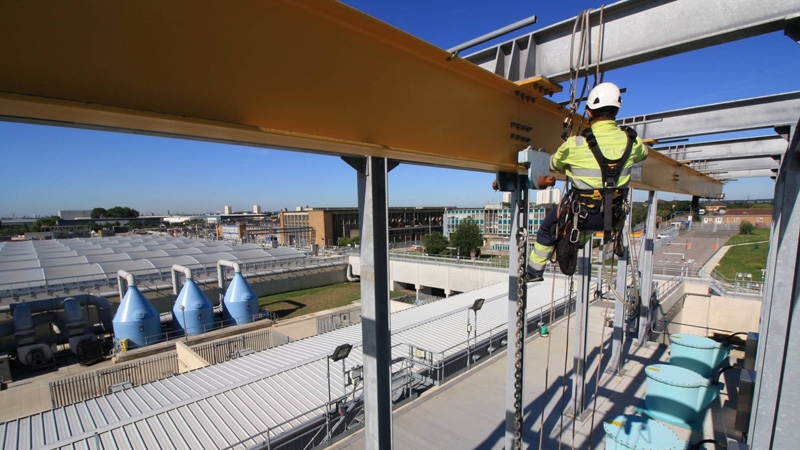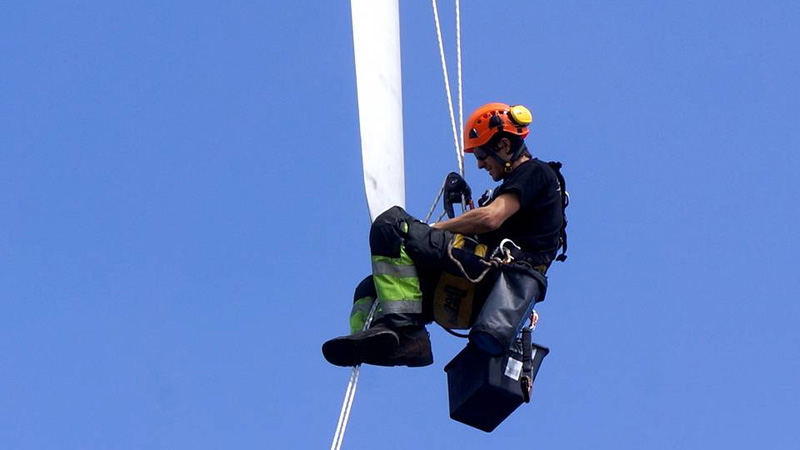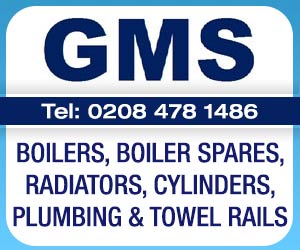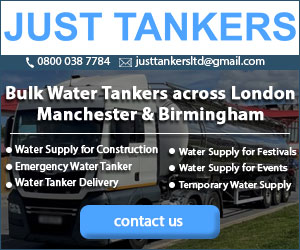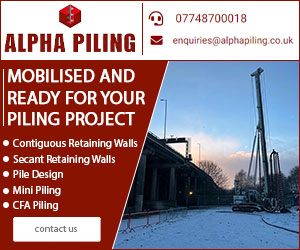Address
Redwood Park Estate
Stallingborough
Stallingborough
Lincolnshire
DN41 8TH
About MCL Height Safety
MCL is a specialist working at height/rope access and difficult access training provider who has state of the art training facilities in East London, South London at CATCH (Centre for the Assessment of Technical Competence). From these world-class training facilities they deliver practical, onsite-based training to members of the oil, gas and renewable industries, construction, stage and theatre rigging, theme parks and many more. Classrooms and simulated industrial environments make for the perfect setting in which to undertake our accredited qualifications. Rope access can be applied to so many difficult or unusual scenarios.
IRATA TRAINING
The use of rope access is now commonplace around the world, on land and offshore; in cities and on coastal cliffs; on ancient buildings and those of 21st century design. Rope access is the preferred method for many working at height, or in areas of confined or difficult access.
IRATA Level 1
The IRATA Level 1 is the entry level into the rope access industry.
An IRATA Level 1 technician will be able to perform a range of rope access manoeuvres and have an understanding of the current legislation.
IRATA Level 2
This IRATA rope access course is for candidates who already have an IRATA Level 1 qualification, plus 1,000 hours of work on ropes, one year of experience from your previous Level 1 assessment and a Level 1 certificate that is still in date.
IRATA Level 3
This IRATA training course is for candidates who already have an IRATA Level 2 qualification, plus 1,000 hours of work on ropes, one year of experience from your previous Level 2 assessment and a Level 2 certificate that is still in date.
WORKING AT HEIGHT
This course covers the use of fall protection equipment when working at height. This course is for personnel who are required to work at height, e.g. roofers, maintenance operatives, surveyors/inspectors and telecom mast/tower climbers.
The course provides you with the relevant skills, knowledge and competence to work at height safely using fall protection equipment.
PFPE COMPETENT INSPECTOR
This course is intended for people who will be carrying out thorough examinations on Personal Fall Protective Equipment e.g store personnel, site supervisors, working at height operatives or rope access operatives. Current legislation requires personal fall protective equipment to be thoroughly examined by a complete person as to the Working at Height and Lifting Operations and Lifting Equipment Regulations.
FIXED LADDER
This course is designed for personnel who carry out inspections on fixed ladders to BS 4211 British Standard which specifies requirements for ladders with single bar rungs intended to be fixed permanently to structures.
This course provides knowledge on the inspection of fixed ladders as per the BS4211 standard, inspection criteria of fixed ladders, fixing element, safety cage and gates/trapdoors.
RESCUE COURSE
This course is for personnel who are required to work at height and already have working at height training with fall protection equipment.
This course has been designed to provide you with the skills, knowledge and competence to undertake a rescue of a co-worker or a casualty who has fallen and is suspended by lanyards. The course covers rescuing a casualty from fall arrest equipment after a fall using prepacked rescue equipment.
MCL ROPE ACCESS AND HEIGHT SAFETY TRAINING IN EAST LONDON, SOUTH LONDON & HUMBERSIDE
For more information, Contact Us
IRATA TRAINING
The use of rope access is now commonplace around the world, on land and offshore; in cities and on coastal cliffs; on ancient buildings and those of 21st century design. Rope access is the preferred method for many working at height, or in areas of confined or difficult access.
IRATA Level 1
The IRATA Level 1 is the entry level into the rope access industry.
An IRATA Level 1 technician will be able to perform a range of rope access manoeuvres and have an understanding of the current legislation.
IRATA Level 2
This IRATA rope access course is for candidates who already have an IRATA Level 1 qualification, plus 1,000 hours of work on ropes, one year of experience from your previous Level 1 assessment and a Level 1 certificate that is still in date.
IRATA Level 3
This IRATA training course is for candidates who already have an IRATA Level 2 qualification, plus 1,000 hours of work on ropes, one year of experience from your previous Level 2 assessment and a Level 2 certificate that is still in date.
WORKING AT HEIGHT
This course covers the use of fall protection equipment when working at height. This course is for personnel who are required to work at height, e.g. roofers, maintenance operatives, surveyors/inspectors and telecom mast/tower climbers.
The course provides you with the relevant skills, knowledge and competence to work at height safely using fall protection equipment.
PFPE COMPETENT INSPECTOR
This course is intended for people who will be carrying out thorough examinations on Personal Fall Protective Equipment e.g store personnel, site supervisors, working at height operatives or rope access operatives. Current legislation requires personal fall protective equipment to be thoroughly examined by a complete person as to the Working at Height and Lifting Operations and Lifting Equipment Regulations.
FIXED LADDER
This course is designed for personnel who carry out inspections on fixed ladders to BS 4211 British Standard which specifies requirements for ladders with single bar rungs intended to be fixed permanently to structures.
This course provides knowledge on the inspection of fixed ladders as per the BS4211 standard, inspection criteria of fixed ladders, fixing element, safety cage and gates/trapdoors.
RESCUE COURSE
This course is for personnel who are required to work at height and already have working at height training with fall protection equipment.
This course has been designed to provide you with the skills, knowledge and competence to undertake a rescue of a co-worker or a casualty who has fallen and is suspended by lanyards. The course covers rescuing a casualty from fall arrest equipment after a fall using prepacked rescue equipment.
MCL ROPE ACCESS AND HEIGHT SAFETY TRAINING IN EAST LONDON, SOUTH LONDON & HUMBERSIDE
For more information, Contact Us
Gallery
News
What is a rescue plan? Find out why it is essential to have one when working at height, what it should include, and the consequences of not having one. Ensure safety and compliance with a well-crafted rescue plan.
A working at height rescue plan is a pre-planned procedure that is designed to be used in the event of a fall from height. Any company, business or workplace where employees work from height should have a rescue plan in place.
When workers are working at height, fall arrest systems should be used to protect them in the event of a fall. A fall arrest system is a body holding device that is connected to a reliable anchor. If the worker falls, the system should arrest and restrict, which should stop the fall before the worker hits the ground or another surface. The worker will then be suspended above the ground in a harness.
In activities, tasks and operations that require a fall arrest system, a working at height rescue plan is required by law. The plan enables the worker to be rescued as quickly as possible.
The plan is designed to safely retrieve any individual who has fallen from a height and is suspended in a harness. It is designed to prevent serious injury and provides information regarding the type of equipment that can be used in the retrieval process and where this equipment is located.
A working at height rescue plan must be accurately planned, supervised and executed by a person, or persons, who are suitable for the job.
The Health and Safety Executive (HSE) states that all working at height rescue plans must address:
The safety of all individuals carrying out the rescue.
Information about the anchor points for the safety equipment.
The suitability of any equipment.
How the individual will be attached to the rescue equipment.
How the individual will be moved using the rescue equipment.
Information about any medical needs or other needs of the individuals involved in the rescue.
Other considerations should include:
Are there any weather or temperature factors that could affect the safety of the worker?
Are there any safety risks for the individuals carrying out the rescue?
Is the equipment safe?
Once all of these factors have been considered, your working at height rescue plan is ready to be implemented.
The rescue plan must be reviewed and updated on a regular basis. It is important to ensure that any equipment or resources that are required as part of the plan are maintained and replenished frequently. The rescue equipment must be available on-site and all employees must receive adequate training on how to correctly use the equipment.
When dealing with a fall from height that requires the retrieval or rescue of the worker, there is a hierarchy of rescue procedures:
1. Lowering the worker remotely.
2. Raising the worker remotely.
3. Self-evacuation by descending.
4. Rescuing another person by descending.
A retrieval or rescue can experience complications if there are any obstructions, edges or other hazards involved. This is because they can increase friction, increase the risk of the anchor line being cut or worn, or could interfere with the rescue equipment.
When attempting a rescue, it is essential that the anchor should be positioned in a way that makes the equipment easier to operate safely.
The anchor point should be arranged in a way that means it does not come into contact with an edge, where possible. If this is not possible, then the equipment should be protected from the edge to reduce the likelihood of damage occurring.
Maintaining a steady and controlled rate of movement during the raising or lowering part of a rescue plan is essential.
When carrying out a working at height rescue plan, you must:
Fully assess the situation before beginning the rescue.
Request the relevant medical or emergency assistance, for example by dialling 999.
Identify the correct position to carry out the rescue.
Identify the safest anchorage points.
Identify a point of safety for the worker to be moved to, following retrieval.
Ensure that everyone involved is aware of the rescue procedure and their own role.
Ensure anyone involved in the rescue is trained, and able to carry out their role.
Ensure the rescue is carried out in a steady and controlled manner.
Ensure effective communication is maintained at all times.
Carefully monitor the condition of the worker and administer first aid where necessary.
Following the rescue, conduct a review of the situation, process and outcomes to help identify any areas for improvement or learning.
When do you need a working at height rescue plan?
In line with the Work at Height Regulations (2005), those in control or charge of any working at height activities and operations must have an up-to-date, deta
A working at height rescue plan is a pre-planned procedure that is designed to be used in the event of a fall from height. Any company, business or workplace where employees work from height should have a rescue plan in place.
When workers are working at height, fall arrest systems should be used to protect them in the event of a fall. A fall arrest system is a body holding device that is connected to a reliable anchor. If the worker falls, the system should arrest and restrict, which should stop the fall before the worker hits the ground or another surface. The worker will then be suspended above the ground in a harness.
In activities, tasks and operations that require a fall arrest system, a working at height rescue plan is required by law. The plan enables the worker to be rescued as quickly as possible.
The plan is designed to safely retrieve any individual who has fallen from a height and is suspended in a harness. It is designed to prevent serious injury and provides information regarding the type of equipment that can be used in the retrieval process and where this equipment is located.
A working at height rescue plan must be accurately planned, supervised and executed by a person, or persons, who are suitable for the job.
The Health and Safety Executive (HSE) states that all working at height rescue plans must address:
The safety of all individuals carrying out the rescue.
Information about the anchor points for the safety equipment.
The suitability of any equipment.
How the individual will be attached to the rescue equipment.
How the individual will be moved using the rescue equipment.
Information about any medical needs or other needs of the individuals involved in the rescue.
Other considerations should include:
Are there any weather or temperature factors that could affect the safety of the worker?
Are there any safety risks for the individuals carrying out the rescue?
Is the equipment safe?
Once all of these factors have been considered, your working at height rescue plan is ready to be implemented.
The rescue plan must be reviewed and updated on a regular basis. It is important to ensure that any equipment or resources that are required as part of the plan are maintained and replenished frequently. The rescue equipment must be available on-site and all employees must receive adequate training on how to correctly use the equipment.
When dealing with a fall from height that requires the retrieval or rescue of the worker, there is a hierarchy of rescue procedures:
1. Lowering the worker remotely.
2. Raising the worker remotely.
3. Self-evacuation by descending.
4. Rescuing another person by descending.
A retrieval or rescue can experience complications if there are any obstructions, edges or other hazards involved. This is because they can increase friction, increase the risk of the anchor line being cut or worn, or could interfere with the rescue equipment.
When attempting a rescue, it is essential that the anchor should be positioned in a way that makes the equipment easier to operate safely.
The anchor point should be arranged in a way that means it does not come into contact with an edge, where possible. If this is not possible, then the equipment should be protected from the edge to reduce the likelihood of damage occurring.
Maintaining a steady and controlled rate of movement during the raising or lowering part of a rescue plan is essential.
When carrying out a working at height rescue plan, you must:
Fully assess the situation before beginning the rescue.
Request the relevant medical or emergency assistance, for example by dialling 999.
Identify the correct position to carry out the rescue.
Identify the safest anchorage points.
Identify a point of safety for the worker to be moved to, following retrieval.
Ensure that everyone involved is aware of the rescue procedure and their own role.
Ensure anyone involved in the rescue is trained, and able to carry out their role.
Ensure the rescue is carried out in a steady and controlled manner.
Ensure effective communication is maintained at all times.
Carefully monitor the condition of the worker and administer first aid where necessary.
Following the rescue, conduct a review of the situation, process and outcomes to help identify any areas for improvement or learning.
When do you need a working at height rescue plan?
In line with the Work at Height Regulations (2005), those in control or charge of any working at height activities and operations must have an up-to-date, deta
Working at height is one of the most dangerous tasks in many industries, from construction to telecommunications. Ensuring that workers are properly trained and equipped with the right skills is vital to maintaining safety standards and preventing accidents. MCL Height Safety offers a Work at Height Training Course that meets the stringent requirements of BS 8454, the Code of Practice for the delivery of training and education for work at height and rescue. This course not only provides essential theoretical knowledge but also integrates practical training to ensure workers are fully prepared for real-world situations.
MCL Height Safety’s Work at Height Training recognises that theoretical knowledge is crucial for understanding the risks and necessary precautions of working at height. However, real-world safety depends just as much on practical experience. That’s why the Work at Height course at MCL incorporates extensive hands-on training alongside classroom-based learning.
What is BS 8454?
The BS 8454 standard specifies the requirements for the delivery of training and education in work at height, rescue, and similar high-risk activities. This British Standard ensures that training programs are not only robust and reliable but are also tailored to the specific needs of individuals and the working environment they face. It emphasises the importance of both theoretical knowledge and practical skills, with particular attention to ensuring that all training is relevant, up-to-date, and follows best practices in safety.
Here’s how MCL aligns with BS 8454 to provide an unparalleled training experience:
Comprehensive Curriculum – MCL’s training course covers the essential topics outlined by BS 8454, including: – Understanding the risks associated with working at height. – Risk assessment techniques and hazard identification. – Selection and use of appropriate personal protective equipment (PPE). – Fall arrest systems, harnesses, and lanyards. – Emergency rescue plans and procedures. By ensuring these elements are covered, MCL ensures workers leave with a thorough understanding of how to approach their work safely and efficiently.
2. Practical Training Modules – BS 8454 emphasises the need for hands-on experience, and MCL delivers with practical modules where trainees can apply what they’ve learned in a controlled environment. During the practical sessions, participants engage in: – Harness fitting and inspection: Learning how to correctly wear, adjust, and inspect harnesses is crucial for safety when working at height. – Fall arrest and restraint techniques: Trainees experience how fall arrest systems work and how to properly use them in various scenarios, from flat roofs to complex structures. – Rescue drills: Knowing how to perform a rescue is as important as preventing a fall. MCL covers rescue techniques, ensuring every participant knows how to act quickly and efficiently in an emergency. These practical exercises align with BS 8454’s mandate for experiential learning, reinforcing theoretical concepts with real-world application; however, additional Rescue training to complement the working at height training is recommended as under the Work At Height Regulations 2005, a rescue plan is a legal requirement.
3. Industry-Relevant Instruction – Every industry has its own unique set of challenges, and MCL tailors its Work at Height course to match the specific needs of each sector. Whether it’s for wind turbines, construction sites, or telecommunications towers, MCL’s training addresses the specific hazards workers are likely to encounter. Trainers have a wealth of real-world experience, ensuring that their instruction is relevant and practical.
4. Assessment and Certification – To comply with BS 8454, training programs must assess participants’ knowledge and practical abilities. MCL’s course includes: written assessments, participants demonstrate their understanding of the theoretical components of the course. – Practical evaluations: Instructors observe and assess trainees’ proficiency during hands-on exercises. Upon successful completion of the course, trainees receive certification, ensuring they are competent to work at height in line with BS 8454 standards.
Why Choose MCL Height Safety?
Compliance with BS 8454: The MCL Work at Height course fully aligns with BS 8454, ensuring trainees receive education and training that meets the highest industry standards.
Experienced Instructors: MCL instructors bring years of field experience and real-world knowledge, giving trainees invaluable insights into best practices.
Customised Solutions: Every workplace is different, and MCL tailors training to suit the specific environments and challenges faced by workers.
Focus on Practical Training: MCL emphasises hands-on experience, ensuring that every trainee is equipped with not just theoretical knowledge
MCL Height Safety’s Work at Height Training recognises that theoretical knowledge is crucial for understanding the risks and necessary precautions of working at height. However, real-world safety depends just as much on practical experience. That’s why the Work at Height course at MCL incorporates extensive hands-on training alongside classroom-based learning.
What is BS 8454?
The BS 8454 standard specifies the requirements for the delivery of training and education in work at height, rescue, and similar high-risk activities. This British Standard ensures that training programs are not only robust and reliable but are also tailored to the specific needs of individuals and the working environment they face. It emphasises the importance of both theoretical knowledge and practical skills, with particular attention to ensuring that all training is relevant, up-to-date, and follows best practices in safety.
Here’s how MCL aligns with BS 8454 to provide an unparalleled training experience:
Comprehensive Curriculum – MCL’s training course covers the essential topics outlined by BS 8454, including: – Understanding the risks associated with working at height. – Risk assessment techniques and hazard identification. – Selection and use of appropriate personal protective equipment (PPE). – Fall arrest systems, harnesses, and lanyards. – Emergency rescue plans and procedures. By ensuring these elements are covered, MCL ensures workers leave with a thorough understanding of how to approach their work safely and efficiently.
2. Practical Training Modules – BS 8454 emphasises the need for hands-on experience, and MCL delivers with practical modules where trainees can apply what they’ve learned in a controlled environment. During the practical sessions, participants engage in: – Harness fitting and inspection: Learning how to correctly wear, adjust, and inspect harnesses is crucial for safety when working at height. – Fall arrest and restraint techniques: Trainees experience how fall arrest systems work and how to properly use them in various scenarios, from flat roofs to complex structures. – Rescue drills: Knowing how to perform a rescue is as important as preventing a fall. MCL covers rescue techniques, ensuring every participant knows how to act quickly and efficiently in an emergency. These practical exercises align with BS 8454’s mandate for experiential learning, reinforcing theoretical concepts with real-world application; however, additional Rescue training to complement the working at height training is recommended as under the Work At Height Regulations 2005, a rescue plan is a legal requirement.
3. Industry-Relevant Instruction – Every industry has its own unique set of challenges, and MCL tailors its Work at Height course to match the specific needs of each sector. Whether it’s for wind turbines, construction sites, or telecommunications towers, MCL’s training addresses the specific hazards workers are likely to encounter. Trainers have a wealth of real-world experience, ensuring that their instruction is relevant and practical.
4. Assessment and Certification – To comply with BS 8454, training programs must assess participants’ knowledge and practical abilities. MCL’s course includes: written assessments, participants demonstrate their understanding of the theoretical components of the course. – Practical evaluations: Instructors observe and assess trainees’ proficiency during hands-on exercises. Upon successful completion of the course, trainees receive certification, ensuring they are competent to work at height in line with BS 8454 standards.
Why Choose MCL Height Safety?
Compliance with BS 8454: The MCL Work at Height course fully aligns with BS 8454, ensuring trainees receive education and training that meets the highest industry standards.
Experienced Instructors: MCL instructors bring years of field experience and real-world knowledge, giving trainees invaluable insights into best practices.
Customised Solutions: Every workplace is different, and MCL tailors training to suit the specific environments and challenges faced by workers.
Focus on Practical Training: MCL emphasises hands-on experience, ensuring that every trainee is equipped with not just theoretical knowledge
IRATA Rope Access Training Level 1, 2 or 3 in South London
MCL Height Safety are full accredited to offer the following levels of IRATA rope access training:
IRATA Rope Access Level 1 - For trainees just starting out
IRATA Rope Access Level 2 - For rope access technicians wanting to progress their career and increase competence
IRATA Rope Access Level 3 - For advanced rope technicians wanting to move into supervisory roles and progress their career in industrial rope access
Rope Access Training London
Course Overview
IRATA Rope Access training provides the skills and knowledge required to work at height where ropes and associated equipment are used to gain access to and from the work position, and to be supported there.
Rope access techniques are used in a wide range of repair, maintenance and inspection roles in industries including offshore oil and gas, renewable energy, confined spaces, power and petrochemical, shipping and harbours.
IRATA Rope Access Training - Level 1
IRATA Level 1 course - An entry level course suitable for those starting a career in rope access no previous experience necessary.
An IRATA Rope Access Level 1 technician is capable of performing a limited range of rope access tasks.
Course Objectives
Delegates completing a Level 1 IRATA Rope Access training course will be able to:
Inspect their own personal rope
Correctly use access equipment
Assist in rig and non-standard operations under the guidance of a higher graduate
Undertake a rescue involving descent by themself and have knowledge of hauling systems
Course Content
A Level 1 IRATA Rope Access training course includes;
The characteristics of a safe system of work
Rope access equipment
Legislation, hazards, risk assessment and method statements
Equipment, conformity, certification and inspection
Emergency and rescue procedures
Prerequisites
There are no prerequisites for the Level 1 IRATA Rope Access course.
IRATA Rope Access Training - Level 2
IRATA Level 2 course - An intermediate level training course for those wanting to progress a career in rope access.
An IRATA Level 2 technician is capable of rigging working ropes, undertaking rescues and performing a variety of rope access tasks.
Course Objectives
Delegates completing a Level 2 IRATA Rope Access training course will be able to;
Undertake advanced rescues under the supervision of an IRATA level 3 rope access technician
Perform advanced rope access tasks under the supervision of an IRATA level 3 rope access technician
Have some knowledge of legislation, safety requirements and quality assurance procedures relating to rope access
Course Content
A Level 2 IRATA Rope Access training course includes;
Legislation, guidelines and standards
Team work and communication
Equipment and rigging including wide 'y' hang, re-belay, deviations, rope and sling protection, pull-through, tensioned lines, work restraint, horizontal lifelines, anchorage selection
Prerequisites
In order to complete a Level 2 IRATA Rope Access training course, delegates must have:
An IRATA Level 1 certificate
A minimum of 1000 hours of experience in rope access work
IRATA Rope Access Training - Level 3
IRATA Level 3 course -A supervisory level training course for those wanting to progress to a rope access supervisor.
An IRATA Level 3 supervisor is capable of site supervision for rope access work projects.
Course Objectives
Delegates completing a Level 3 IRATA Rope Access training course will be able to:
Supervise rope access work projects
Understand relevant work techniques and legislation
Demonstrate all the skills and knowledge required of IRATA rope access levels 1 and 2
Demonstrate comprehensive knowledge of advanced rescue techniques
Show that suitable first aid training has been undertaken (and hold an appropriate and valid first aid certificate)
Have knowledge of the IRATA training, assessment and certification scheme
Be familiar with the contents of the IRATA International Code of Practice (ICOP)
Course Content
A Level 3 IRATA Rope Access training course includes;
Equipment inspection
Management and records
Risk assessment and method statements
Rescue management
Prerequisites
In order to complete a Level 3 Rope Access training course, delegates must have:
Held an IRATA Level 2 certificate for at least 1 year
A minimum of 1000 hours of experience in rope access work at level 2
IRATA Rope Access Training Refresher
Rope access technicians who have not been engaged in rope access work for more than six months are required to attend suitable rope access refresher training before being allowed to work.
MCL offer a full range of IRATA Rope Access Refresher training including:
IRATA Rope Acess Refresher Level 1 - Covering all techniques from initial rope access training and relevant legislation
IRATA Rope Access Refresher Level 2 and 3 - Focusing on rigging and rescue procedures
MCL also offer a full range of revalidation courses f
MCL Height Safety are full accredited to offer the following levels of IRATA rope access training:
IRATA Rope Access Level 1 - For trainees just starting out
IRATA Rope Access Level 2 - For rope access technicians wanting to progress their career and increase competence
IRATA Rope Access Level 3 - For advanced rope technicians wanting to move into supervisory roles and progress their career in industrial rope access
Rope Access Training London
Course Overview
IRATA Rope Access training provides the skills and knowledge required to work at height where ropes and associated equipment are used to gain access to and from the work position, and to be supported there.
Rope access techniques are used in a wide range of repair, maintenance and inspection roles in industries including offshore oil and gas, renewable energy, confined spaces, power and petrochemical, shipping and harbours.
IRATA Rope Access Training - Level 1
IRATA Level 1 course - An entry level course suitable for those starting a career in rope access no previous experience necessary.
An IRATA Rope Access Level 1 technician is capable of performing a limited range of rope access tasks.
Course Objectives
Delegates completing a Level 1 IRATA Rope Access training course will be able to:
Inspect their own personal rope
Correctly use access equipment
Assist in rig and non-standard operations under the guidance of a higher graduate
Undertake a rescue involving descent by themself and have knowledge of hauling systems
Course Content
A Level 1 IRATA Rope Access training course includes;
The characteristics of a safe system of work
Rope access equipment
Legislation, hazards, risk assessment and method statements
Equipment, conformity, certification and inspection
Emergency and rescue procedures
Prerequisites
There are no prerequisites for the Level 1 IRATA Rope Access course.
IRATA Rope Access Training - Level 2
IRATA Level 2 course - An intermediate level training course for those wanting to progress a career in rope access.
An IRATA Level 2 technician is capable of rigging working ropes, undertaking rescues and performing a variety of rope access tasks.
Course Objectives
Delegates completing a Level 2 IRATA Rope Access training course will be able to;
Undertake advanced rescues under the supervision of an IRATA level 3 rope access technician
Perform advanced rope access tasks under the supervision of an IRATA level 3 rope access technician
Have some knowledge of legislation, safety requirements and quality assurance procedures relating to rope access
Course Content
A Level 2 IRATA Rope Access training course includes;
Legislation, guidelines and standards
Team work and communication
Equipment and rigging including wide 'y' hang, re-belay, deviations, rope and sling protection, pull-through, tensioned lines, work restraint, horizontal lifelines, anchorage selection
Prerequisites
In order to complete a Level 2 IRATA Rope Access training course, delegates must have:
An IRATA Level 1 certificate
A minimum of 1000 hours of experience in rope access work
IRATA Rope Access Training - Level 3
IRATA Level 3 course -A supervisory level training course for those wanting to progress to a rope access supervisor.
An IRATA Level 3 supervisor is capable of site supervision for rope access work projects.
Course Objectives
Delegates completing a Level 3 IRATA Rope Access training course will be able to:
Supervise rope access work projects
Understand relevant work techniques and legislation
Demonstrate all the skills and knowledge required of IRATA rope access levels 1 and 2
Demonstrate comprehensive knowledge of advanced rescue techniques
Show that suitable first aid training has been undertaken (and hold an appropriate and valid first aid certificate)
Have knowledge of the IRATA training, assessment and certification scheme
Be familiar with the contents of the IRATA International Code of Practice (ICOP)
Course Content
A Level 3 IRATA Rope Access training course includes;
Equipment inspection
Management and records
Risk assessment and method statements
Rescue management
Prerequisites
In order to complete a Level 3 Rope Access training course, delegates must have:
Held an IRATA Level 2 certificate for at least 1 year
A minimum of 1000 hours of experience in rope access work at level 2
IRATA Rope Access Training Refresher
Rope access technicians who have not been engaged in rope access work for more than six months are required to attend suitable rope access refresher training before being allowed to work.
MCL offer a full range of IRATA Rope Access Refresher training including:
IRATA Rope Acess Refresher Level 1 - Covering all techniques from initial rope access training and relevant legislation
IRATA Rope Access Refresher Level 2 and 3 - Focusing on rigging and rescue procedures
MCL also offer a full range of revalidation courses f
Teetering on the edge of a tall building, dangling from a rope high up in a city centre, perched on the edge of a cliff or working on the blade of a wind turbine – do these sound like the situations you would like to find yourself in? If so, then a career in rope access could be for you!
The best way to do this is by completing an IRATA course. They vary in levels depending on experience.
IRATA Rope Access:.
• Level 1 – entry level course covering a range of rope access manoeuvres, the inspection of personal protection equipment, fundamental rescue procedures and current legislation
• Level 2 – intermediate course building on level 1 training that teaches the knowledge and practice of rope rigging, safety requirements, rescues and QA procedures
• Level 3 – highest level course teaching a comprehensive knowledge of advanced rescue techniques and best practices, allowing those who pass to become site supervisors Additional training
13 – 17 Feb 23
6 – 10 March 23
13 – 17 March 23
3 – 7 April 23
10 – 14 April 23
Additional training includes First Aid and their own inhouse, highly rated training such as Anchor Bolt Installation and Testing, Fixed Ladder Inspection, Confined spaces and PFPE Competent Inspector course Working at Heights, Manual Handling.
This all takes place in established, fully equipped facilities at CATCH (Centre for the Assessment of Technical Competence Humber). This new facility based in the industrially rich region of the Humber, provides a safe and authentic site environment with full-scale equipment for experiential learning and development. World-class facilities From these world-class training facilities MCL deliver practical, onsite-based training to members of the oil, gas and renewable industries, construction, stage and theatre rigging, theme parks and many more. Classrooms and simulated industrial environments make for the perfect setting in which to undertake accredited qualifications.
Rope access can be applied to so many difficult or unusual scenarios – so knowing MCL can get you there, its time to take the plunge! Training locations include Humberside, South London & East London.
MCL Height Safety
Tel: 0208 558 5688
W: www.mcl-uk.com
#humberside #humbersideropeaccess #humbersidetraining #humbersiderenewables #ropeaccess#ropeaccesshumberside #grimsbytraining #ropeaccesstraining #iratahumberside #iratatraining#iratahumbersidetraining
The best way to do this is by completing an IRATA course. They vary in levels depending on experience.
IRATA Rope Access:.
• Level 1 – entry level course covering a range of rope access manoeuvres, the inspection of personal protection equipment, fundamental rescue procedures and current legislation
• Level 2 – intermediate course building on level 1 training that teaches the knowledge and practice of rope rigging, safety requirements, rescues and QA procedures
• Level 3 – highest level course teaching a comprehensive knowledge of advanced rescue techniques and best practices, allowing those who pass to become site supervisors Additional training
13 – 17 Feb 23
6 – 10 March 23
13 – 17 March 23
3 – 7 April 23
10 – 14 April 23
Additional training includes First Aid and their own inhouse, highly rated training such as Anchor Bolt Installation and Testing, Fixed Ladder Inspection, Confined spaces and PFPE Competent Inspector course Working at Heights, Manual Handling.
This all takes place in established, fully equipped facilities at CATCH (Centre for the Assessment of Technical Competence Humber). This new facility based in the industrially rich region of the Humber, provides a safe and authentic site environment with full-scale equipment for experiential learning and development. World-class facilities From these world-class training facilities MCL deliver practical, onsite-based training to members of the oil, gas and renewable industries, construction, stage and theatre rigging, theme parks and many more. Classrooms and simulated industrial environments make for the perfect setting in which to undertake accredited qualifications.
Rope access can be applied to so many difficult or unusual scenarios – so knowing MCL can get you there, its time to take the plunge! Training locations include Humberside, South London & East London.
MCL Height Safety
Tel: 0208 558 5688
W: www.mcl-uk.com
#humberside #humbersideropeaccess #humbersidetraining #humbersiderenewables #ropeaccess#ropeaccesshumberside #grimsbytraining #ropeaccesstraining #iratahumberside #iratatraining#iratahumbersidetraining
Height Safety Training for Stunt Performers and Actors
At MCL Height Safety we provide training for stunt performers and actors to stay safe in their work and have a knowledge of best practice.
A stuntperson is a unique type of storyteller and must be able to move the narrative of the piece forward through action. Their stunts must be believable and lifelike, which is why it’s so important to think of a stunt performer as a movement professional.The courses we offer are perfectly suited to those who are seriously considering a career as a professional stunt performer or an existing actor and stunt performer that require additional skills and a knowledge of working at height, confined spaces or rope access.
COURSES INCLUDE:
- WORKING AT HEIGHT
- CONFINED SPACES
- SEA SURVIVAL
- ROPE ACCESS
- RESCUE
We reguarly run these courses at our facilities in East London, South London and Humberside.
Use the https://www.mcl-uk.com for more information and book or call 020 8558 5688
At MCL Height Safety we provide training for stunt performers and actors to stay safe in their work and have a knowledge of best practice.
A stuntperson is a unique type of storyteller and must be able to move the narrative of the piece forward through action. Their stunts must be believable and lifelike, which is why it’s so important to think of a stunt performer as a movement professional.The courses we offer are perfectly suited to those who are seriously considering a career as a professional stunt performer or an existing actor and stunt performer that require additional skills and a knowledge of working at height, confined spaces or rope access.
COURSES INCLUDE:
- WORKING AT HEIGHT
- CONFINED SPACES
- SEA SURVIVAL
- ROPE ACCESS
- RESCUE
We reguarly run these courses at our facilities in East London, South London and Humberside.
Use the https://www.mcl-uk.com for more information and book or call 020 8558 5688
Rope Access specialists MCL have recently opened an additional new training facility alongside Lighthouse Safety, a leading Health and Safety training company who offer courses including CITB, and NEBOSH plus Mental Health training and Safety & Access a leading supplier of scaffold and mobile tower training in London.
There is a great synergy between our businesses and combined we can offer the ever expanding requirement for safe working training in the great location of Earlsfield, Wandsworth.
Here we will deliver our first class MCL accredited courses including
Working at Height
Fixed Ladder Inspection
Anchor Bolt Installation & Testing
Rescue
Personal Fall Protection Equipment training
with additional courses in the future.
Our new premises are a short walk from Earlsfield Station and nearby carparks.
Please give us a call on 020 8558 5688 or email info@mcl-uk.com if you are interested in booking a London course.
There is a great synergy between our businesses and combined we can offer the ever expanding requirement for safe working training in the great location of Earlsfield, Wandsworth.
Here we will deliver our first class MCL accredited courses including
Working at Height
Fixed Ladder Inspection
Anchor Bolt Installation & Testing
Rescue
Personal Fall Protection Equipment training
with additional courses in the future.
Our new premises are a short walk from Earlsfield Station and nearby carparks.
Please give us a call on 020 8558 5688 or email info@mcl-uk.com if you are interested in booking a London course.
ANCHOR BOLT INSTALLATION & TESTING
We have just added the following courses to the website.
LONDON
11 - 12 August 2022
22 - 23 September 2022
LINCOLNSHIRE
5 - 6 September 2022
3 - 4 October 2022
MORE INFO AND BOOKING HERE: https://www.mcl-uk.com/courses/anchor-bolt-installation-testing-course
We have just added the following courses to the website.
LONDON
11 - 12 August 2022
22 - 23 September 2022
LINCOLNSHIRE
5 - 6 September 2022
3 - 4 October 2022
MORE INFO AND BOOKING HERE: https://www.mcl-uk.com/courses/anchor-bolt-installation-testing-course
What does rope access training involve
Those looking to enter the rope access industry may be somewhat overwhelmed by the training and qualifications required to get started. From manoeuvres and rescue procedures to regulations and safety requirements, it may seem that there is a lot to learn at first. But we think that the process gets far more manageable with clarity and practice. As such, this post will be diving into the exact nature of rope access training courses so that you know what to expect in future. We hope that once you understand the basic outline of rope access training, you feel more encouraged to get stuck in!
Certification levels
Rope access training courses have three certification levels, each of which have different content and criteria. These courses are devised and assessed by The Industrial Rope Access Training Association (IRATA), the international governing body within the rope access industry. In sum, the general structure and requirements of each level is as follows:
Level 1: entry level course covering a range of rope access manoeuvres, the inspection of rigging equipment, fundamental rescue procedures and current legislation.
Level 2: intermediate course building on level 1 training that teaches the knowledge and practice of rope rigging, safety requirements, rescues and QA procedures.
Level 3: highest level course teaching a comprehensive knowledge of advanced rescue techniques and best practices, allowing those who pass to become site supervisors.
Completing each of these levels gains you a qualification which lasts for three years before expiring, and each course costs around the £850 mark. Progression between levels requires a minimum of one year and 1,000 hours spent on the ropes (with hours logged and certified by a level 3 supervisor). For obvious reasons, candidates are expected to have an appropriate level of health, fitness, strength, and coordination.
Preparing for training
So that you’re not completely in the dark, we recommend that you brush up on some basic knowledge before you start formal training. Familiarise yourself with some of the manoeuvres required for rope access work, gain a basic understanding of the knots and supplies that you will be using, and read a little bit about work at height regulations. While you don’t need to know absolutely everything about rope access beforehand (that is what the course is for), it’s best to start training with some fundamentals already in place. It will save you a bit of time as you won’t have to keep catching up, and it will make a good impression on your trainers and supervisors. Read through some of the articles on our blog to get started. You may also want to loosen your muscles by doing regular stretches and light exercises in the run-up to your training. The physical aspect of rope access isn’t too taxing, but certain manoeuvres can be quite demanding so it’s best to prepare your body too.
The training
Rope access training courses take place over the course of five days and as such the progression can be quite intensive, but it’s still enough time to cover all the necessary material. As with any trade, you will gain the majority of your learning experience in practice when you start working on real projects, but it’s important for employers and supervisors to know that you are properly qualified before you get on the ropes. Even if you are coming into training from a rock climbing background it’s important to pay full attention: the rope access industry involves completely different skills and terms to those used in a rock climbing context. After all, this is not a sport but an industry with high standards of safety. The training is largely based in practical exercises, and theoretical knowledge is taught during breaks in between these exercises. For the most part, you will be watching and learning from demonstrations performed by your trainers before repeating their movements yourself. So don’t expect to spend so much time sitting down and absorbing information, expect to be up there on the ropes practicing important exercises and manoeuvres yourself. Make sure that you listen carefully to the feedback you receive so that you can see improvements on your form and technique.
The assessment
Each training course culminates in a written and practical assessment. They are examined and supervised by IRATA assessors with years of experience in the industry and the highest of rope access qualifications, but don’t let that scare you. Just remember, the course is there to help you learn more and perform better. The main interest of the assessors will be to ensure that all trainees know their responsibilities and are capable of carrying out tasks safely as a team. Ultimately, nobody is trying to trick you out in these courses, and you are as entitled to ask the assessors questions as they are to grill you on technique and regulations. You should make the most of this opportunity to practice and
Those looking to enter the rope access industry may be somewhat overwhelmed by the training and qualifications required to get started. From manoeuvres and rescue procedures to regulations and safety requirements, it may seem that there is a lot to learn at first. But we think that the process gets far more manageable with clarity and practice. As such, this post will be diving into the exact nature of rope access training courses so that you know what to expect in future. We hope that once you understand the basic outline of rope access training, you feel more encouraged to get stuck in!
Certification levels
Rope access training courses have three certification levels, each of which have different content and criteria. These courses are devised and assessed by The Industrial Rope Access Training Association (IRATA), the international governing body within the rope access industry. In sum, the general structure and requirements of each level is as follows:
Level 1: entry level course covering a range of rope access manoeuvres, the inspection of rigging equipment, fundamental rescue procedures and current legislation.
Level 2: intermediate course building on level 1 training that teaches the knowledge and practice of rope rigging, safety requirements, rescues and QA procedures.
Level 3: highest level course teaching a comprehensive knowledge of advanced rescue techniques and best practices, allowing those who pass to become site supervisors.
Completing each of these levels gains you a qualification which lasts for three years before expiring, and each course costs around the £850 mark. Progression between levels requires a minimum of one year and 1,000 hours spent on the ropes (with hours logged and certified by a level 3 supervisor). For obvious reasons, candidates are expected to have an appropriate level of health, fitness, strength, and coordination.
Preparing for training
So that you’re not completely in the dark, we recommend that you brush up on some basic knowledge before you start formal training. Familiarise yourself with some of the manoeuvres required for rope access work, gain a basic understanding of the knots and supplies that you will be using, and read a little bit about work at height regulations. While you don’t need to know absolutely everything about rope access beforehand (that is what the course is for), it’s best to start training with some fundamentals already in place. It will save you a bit of time as you won’t have to keep catching up, and it will make a good impression on your trainers and supervisors. Read through some of the articles on our blog to get started. You may also want to loosen your muscles by doing regular stretches and light exercises in the run-up to your training. The physical aspect of rope access isn’t too taxing, but certain manoeuvres can be quite demanding so it’s best to prepare your body too.
The training
Rope access training courses take place over the course of five days and as such the progression can be quite intensive, but it’s still enough time to cover all the necessary material. As with any trade, you will gain the majority of your learning experience in practice when you start working on real projects, but it’s important for employers and supervisors to know that you are properly qualified before you get on the ropes. Even if you are coming into training from a rock climbing background it’s important to pay full attention: the rope access industry involves completely different skills and terms to those used in a rock climbing context. After all, this is not a sport but an industry with high standards of safety. The training is largely based in practical exercises, and theoretical knowledge is taught during breaks in between these exercises. For the most part, you will be watching and learning from demonstrations performed by your trainers before repeating their movements yourself. So don’t expect to spend so much time sitting down and absorbing information, expect to be up there on the ropes practicing important exercises and manoeuvres yourself. Make sure that you listen carefully to the feedback you receive so that you can see improvements on your form and technique.
The assessment
Each training course culminates in a written and practical assessment. They are examined and supervised by IRATA assessors with years of experience in the industry and the highest of rope access qualifications, but don’t let that scare you. Just remember, the course is there to help you learn more and perform better. The main interest of the assessors will be to ensure that all trainees know their responsibilities and are capable of carrying out tasks safely as a team. Ultimately, nobody is trying to trick you out in these courses, and you are as entitled to ask the assessors questions as they are to grill you on technique and regulations. You should make the most of this opportunity to practice and
Have you been considering starting out in Rope Access or upgrading your existing certification?
IRATA Rope Access training provides the knowledge and skills required to work at height where ropes and associated equipment are used to gain access to and from the work position, and to be supported there.
Rope access techniques are used in a wide range of repair, maintenance and inspection roles in industries including offshore oil and gas, renewable energy, confined spaces, power, window cleaning.
In addition to our HQ in London we are holding IRATA LEVEL 1, 2 and 3 training courses at our facility in Humberside.
Dates include:
15th – 19th August
22nd – 26th August
12th – 16th September
19th – 23rd September
For further information view our website, call 020 8558 5688 or email info@mcl-uk.com
IRATA Rope Access training provides the knowledge and skills required to work at height where ropes and associated equipment are used to gain access to and from the work position, and to be supported there.
Rope access techniques are used in a wide range of repair, maintenance and inspection roles in industries including offshore oil and gas, renewable energy, confined spaces, power, window cleaning.
In addition to our HQ in London we are holding IRATA LEVEL 1, 2 and 3 training courses at our facility in Humberside.
Dates include:
15th – 19th August
22nd – 26th August
12th – 16th September
19th – 23rd September
For further information view our website, call 020 8558 5688 or email info@mcl-uk.com
Industrial Rope Access Training Association IRATA Courses
IRATA Level 1
18th - 22nd July
1st - 5th August
8th - 12th August
15th -19th August
5th - 9th September
12th - 16th September
19th - 23rd September
IRATA Level 2
18th - 22nd July
1st - 5th August
8th - 12th August
15th -19th August
5th - 9th September
12th - 16th September
19th - 23rd September
IRATA Level 3
18th - 22nd July
1st - 5th August
8th - 12th August
15th -19th August
5th - 9th September
12th - 16th September
19th - 23rd September
IRATA Level 1
18th - 22nd July
1st - 5th August
8th - 12th August
15th -19th August
5th - 9th September
12th - 16th September
19th - 23rd September
IRATA Level 2
18th - 22nd July
1st - 5th August
8th - 12th August
15th -19th August
5th - 9th September
12th - 16th September
19th - 23rd September
IRATA Level 3
18th - 22nd July
1st - 5th August
8th - 12th August
15th -19th August
5th - 9th September
12th - 16th September
19th - 23rd September
Height Safety Training Provider MCL joins Scaffolding Training provider Safety & Access at their Humberside Training Centre
MCL is a specialist working at height/rope access and difficult access training provider and fellow Kee Safety Group company, which has recently joined us at our state of the art facility at CATCH (Centre for the Assessment of Technical Competence).
This new facility based in the industrially-rich region of the Humber, provides a safe and authentic site environment with full-scale equipment for experiential learning and development. From these world-class training facilities MCL and Safety & Access deliver practical, onsite-based training to members of the oil, gas and renewable industries, construction, stage and theatre rigging, theme parks and many more.
Classrooms and simulated industrial environments make for the perfect setting in which to undertake our accredited qualifications. Rope access can be applied to so many difficult or unusual scenarios.
Upcoming training provided by MCL includes:
IRATA Levels 1, 2 & 3
Working at Height
Anchor Bolt Installation & Testing
Fixed Ladder Inspection Training
Rescue Course
PFPE Inspection
First Aid
“With all of the diverse industry sectors which are situated in and around Lincolnshire, the decision was taken to open our new training facility at CATCH, in Grimsby.
Not only do we offer the internationally accredited IRATA rope access courses, our highly skilled and knowledgable team also deliver a range of Height Safety oriented courses such as Work at Height, Rescue, Harness & Lanyard Use, Fixed Ladder Inspection, Anchor Bolt Installation & Testing courses are also offered as well PFPE (Personal Fall Protection Equipment) Inspection courses which will be a great service for those in this area”
Martin Castle, General Manager MCL
“It’s great for Safety & Access and for the overall offerings at CATCH to have such well-regulated training available as IRATA via MCL. There are great opportunities within many sectors for this training and it compliments well the work at height elements of training within scaffolding foddered by S&A under the CISRS range of competence standards. We look forward to a long association with MCL here and in other locations to be disclosed in the near future”
Rick Statham GM Safety & Access
Training can be found on the MCL website www.mcl-uk.com or contact info@mcl-uk.com
MCL is a specialist working at height/rope access and difficult access training provider and fellow Kee Safety Group company, which has recently joined us at our state of the art facility at CATCH (Centre for the Assessment of Technical Competence).
This new facility based in the industrially-rich region of the Humber, provides a safe and authentic site environment with full-scale equipment for experiential learning and development. From these world-class training facilities MCL and Safety & Access deliver practical, onsite-based training to members of the oil, gas and renewable industries, construction, stage and theatre rigging, theme parks and many more.
Classrooms and simulated industrial environments make for the perfect setting in which to undertake our accredited qualifications. Rope access can be applied to so many difficult or unusual scenarios.
Upcoming training provided by MCL includes:
IRATA Levels 1, 2 & 3
Working at Height
Anchor Bolt Installation & Testing
Fixed Ladder Inspection Training
Rescue Course
PFPE Inspection
First Aid
“With all of the diverse industry sectors which are situated in and around Lincolnshire, the decision was taken to open our new training facility at CATCH, in Grimsby.
Not only do we offer the internationally accredited IRATA rope access courses, our highly skilled and knowledgable team also deliver a range of Height Safety oriented courses such as Work at Height, Rescue, Harness & Lanyard Use, Fixed Ladder Inspection, Anchor Bolt Installation & Testing courses are also offered as well PFPE (Personal Fall Protection Equipment) Inspection courses which will be a great service for those in this area”
Martin Castle, General Manager MCL
“It’s great for Safety & Access and for the overall offerings at CATCH to have such well-regulated training available as IRATA via MCL. There are great opportunities within many sectors for this training and it compliments well the work at height elements of training within scaffolding foddered by S&A under the CISRS range of competence standards. We look forward to a long association with MCL here and in other locations to be disclosed in the near future”
Rick Statham GM Safety & Access
Training can be found on the MCL website www.mcl-uk.com or contact info@mcl-uk.com
 UK
UK Ireland
Ireland Scotland
Scotland London
London

